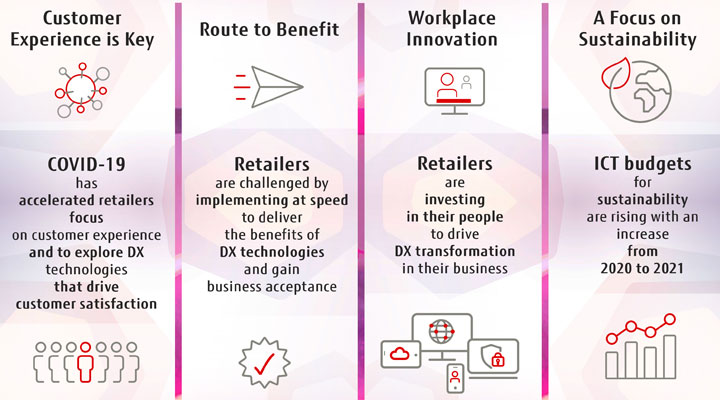At this point we all know Covid-19 has touched most parts of the retail industry – that’s a given. What is difficult to understand, however, is how things have changed.
And with the Australian retail industry set to return in full force in FY22, businesses need to ensure they are doing what is necessary to meet these new wants and needs from their customers. And the clock is ticking.
“We used to say survival of the fittest, but what we’re talking about now is survival of the fastest,” said Clare Burden, Fujitsu Australia’s Head of Industry – Retail.
“We saw that [at the onset of the Covid-19 pandemic]. The stores that already had an online presence were in a much better place than others, because they were already ahead of the curve.”
“Customers now expect retailers to provide consistent, seamless omnichannel interactions. While maintaining loyalty to brands which reflect their own values – be it sustainability, social impact or personalised services.”
To help businesses make sure they are investing in the right things moving forward, Fujitsu conducted a survey of 166 retail ICT decision makers across 15 countries. They have now released the Global Digital Transformation Report outlining a number of trends that are already taking shape, and which will become more important in the years ahead.

Customer experience is key
Customers’ expectations have changed, and the way they expect retailers to do business has changed. What they want from bricks-and-mortar stores has changed as well, as has what they expect from an online experience.
“What we’re seeing now aligns with what we call the ‘now generation’,” said Burden.
“They want to buy it now. They want it available now. They want it delivered now. They want speed, but also to know their personal and payment details are kept safe.”
Delivering all of these things to consumers is not easy, Burden said, but necessary in order to drive sales and loyalty as the industry opens back up.
And much of the gains to be made here are tied to data, AI and utilising the internet of things to bring different parts of the business together in ways that are seamless for the customer, while also gathering the necessary data to present a compelling personalised experience.
Route to benefit
One of the most difficult aspects of digital transformations at the moment is how long it can take to deliver them: If a business is behind the times it needs to get up to speed immediately, but it can often take months to get to the end of a transformation.
According to the report, 76 per cent of respondents said that having enough time to deliver a digital transformation was their number one challenge.
As a result, planning out a business’ ‘route of benefit’ becomes incredibly important, and smaller investments in efficiency, productivity and data analysis become a good way of improving things over time.
Over two-thirds of retailers are investing in technologies such as the internet of things, AI and machine learning, predictive sales analytics, and real-time data analytics, due to the fact that they help to improve the customer experience while also supporting the business’ operational efficiencies.
Workplace innovation
While many investments are customer-facing, not all need to be.
Many businesses are investing in ways to create workplace flexibility and agility, as well as ways to help employees to work from home more effectively.
According to Fujitsu, retailers are increasingly investing in their people to drive digital transformations in their business.
In fact, 72.5 per cent of all digital transformation efforts are being implemented in an effort to improve the working experience for employees, in addition to the improvement to the customer experience.
Many businesses are upping their investments in technology such as laptops and phones for staff, while also working to create secure remote working environments and extending the use of team-based collaboration tools, such as Microsoft Teams.
A focus on sustainability
And, as the retail industry continues to grapple with its impact on the world around it, planned improvements to the technologies used by businesses are being seen through a greener lens than years past.
Corporate responsibility is becoming increasingly important in boardrooms across the country, as well as efforts to improve a business’ impact on the environment.
Always Open
To support retailers to make these changes, Fujitsu’s ‘Always Open Retail’ approach helps brands to make the transformative steps they need in order to achieve rapid digital transformation in a Covid era.
Under this new banner, Fujitsu is helping businesses to implement new data, analytics and AI solutions, as well as the digital workplace services that will help them to succeed. While driving businesses to continue to adapt and thrive in a dynamic and changing business environment.
“Always Open Retail means that Fujitsu’s retail customers remain open to serve, trade and innovate. Allowing customers to be able to buy when and where they want to buy,” said Burden.
To get a copy of Fujitsu’s 2021 Digital Transformation Trends for the Retail Industry report, click here,






